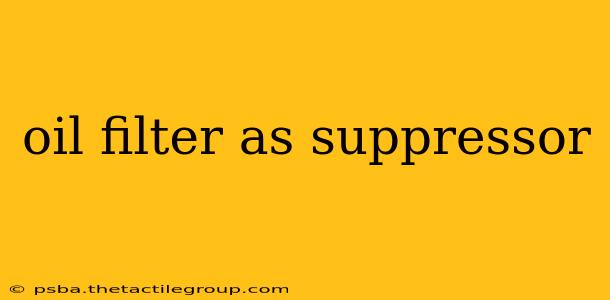The internet is rife with unconventional ideas, and one that occasionally surfaces is the use of an oil filter as a firearm suppressor. While the allure of readily available materials for such a purpose is understandable, it's crucial to understand the significant dangers and illegality involved. This article will explore the feasibility and risks of using an oil filter as a suppressor, emphasizing the importance of safety and legal compliance.
The Allure of Improvisation: Why People Consider Oil Filters
The primary motivation behind using an oil filter as a suppressor stems from its readily available nature and perceived sound-dampening properties. The porous nature of the filter media might seem like it could absorb some of the expanding gases from a gunshot, reducing noise. However, this perception is dangerously misleading.
The Reality: Why Oil Filters Fail as Suppressors
Oil filters are not designed for the extreme pressures and temperatures generated by a firearm discharge. Attempting to use one as a suppressor carries several critical risks:
1. Ineffective Noise Reduction:
While an oil filter might muffle the sound slightly, it will not provide anywhere near the level of noise reduction offered by a properly designed and manufactured suppressor. The majority of the noise from a gunshot comes from the supersonic expansion of gases, a phenomenon an oil filter is incapable of mitigating effectively.
2. Catastrophic Failure:
The immense pressure within the barrel of a firearm during discharge can easily rupture an oil filter, sending shrapnel towards the shooter or bystanders. This poses a serious risk of injury or death. The filter's materials are simply not designed to withstand these forces.
3. Legal Ramifications:
Constructing and using homemade suppressors is illegal in most jurisdictions. Even if the intention is not malicious, possessing or using an improvised suppressor carries severe penalties, including hefty fines and imprisonment. The legal consequences far outweigh any perceived benefits.
4. Inconsistent Performance:
The performance of a makeshift suppressor made from an oil filter would be highly inconsistent and unreliable. Factors like the specific type of filter, the firearm used, and even the ammunition can drastically affect its "suppression" capabilities, leading to unpredictable and potentially dangerous results.
The Safer Alternative: Legally Manufactured Suppressors
For those seeking to reduce the noise of their firearms, the only safe and legal option is to purchase a properly manufactured suppressor. These devices are rigorously tested and designed to withstand the pressures of gunfire while providing effective noise reduction. They are also subject to strict regulations and require legal registration in many areas.
Conclusion: Avoid the Risk
Using an oil filter as a suppressor is not only ineffective but also incredibly dangerous and illegal. The potential for severe injury or death far outweighs any perceived benefits. Always prioritize safety and legal compliance. If you're interested in sound suppression for firearms, explore the legal options available in your jurisdiction and consider purchasing a legally manufactured suppressor. Your safety and the safety of others should always be the paramount concern.

